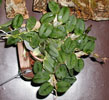|
|
|
|
 |
Email Address Recovery or Password Reset |
Use our Change Password page, and you can set a new password, or if you don't remember which email address you
registered with, the same page may be able to suggest it based on another you enter.
|
|
|
|
|
| |
Flasks of
Sophronitis cernua 'La pinta' × self |
|
| |
|
|
| |
| Number: |
TN3801 |
| Name: |
Sophronitis cernua 'La pinta' × self
|
| Type: |
self (What's that?) |
|
Seed Donor: |
Zachary Bittner
|
|
Click to Enlarge

Pod Parent Blooming Plant |
Click to Enlarge

Pod Parent Plant with Capsules |
Click to Enlarge

Pod Parent Blooming Plant |
|
|
|
| |
Culture Notes from Donor: Parent plant: Temperature range I (60-83°F). This plant likes to grow on a mount or in a clay pot. Prefers high light and intermediate temperatures. High humidity certainly won't hurt this plant. This is a much more robust plant than others in the genus Sophronitis. It can also tolerate higher levels of salts in water.
Comments: Parent plant: Flower shape and color are excellent for this species. Plant is a very large and hardy individual of this small species. Blooms several times throughout the year.
For additional origin/habitat information supplied courtesy of
Charles and Margaret Baker, see further below, near the bottom of this page.
|
Temperatures we attempt to use in the lab & greenhouse:
| For Species: |
|
Spring, Summer, Autumn: days average 84°F, nights 72°F; best fit is Warm 90-70°F
(Source:
Baker's Web OSC) |
| For Species: |
|
Winter: days average 76°F, nights 64°F; best fit is Cool-Intermediate 75-58°F
(Source:
Baker's Web OSC) |
|
About the name...
| Etymology of |
cernua |
|
From Latin "cernuus" overhanging, nodding.
(Source:
Mayr & Schmucker 1998) |
| Etymology of |
sophronitis |
|
From latinized Greek "sophros" modest.
(Source:
Mayr & Schmucker 1998) |
| Pronunciation of |
cernua |
|
SER-nyoo-ah
(Source:
Hawkes 1978) |
| Pronunciation of |
sophronitis |
|
sof-row-NYE-tis
(Source:
Hawkes 1978) |
|
If you would like to direct someone to this web page, please copy and paste this URL into your email:
http://troymeyers.com/d?013801
| Flask Information |
| Availability: |
We have sold all of the flasks for this item. |
| You should: |
Consider getting individual plants or compots instead of a flask.
You can place a "Notify Flask Recipients" Request, and either we or a flask recipient may contact you when plants are available.
You may also place a "Notify Retries" Request, and if an identical pollination (the same parents) is done again, we'll let you know.
You may reserve a flask, but it's very unlikely you'll get one ...this could only happen if we found a flask that we didn't know we had. |
| Yield Estimate: |
300 plants (based on flask surveys done 07/02/2004 )
|
| Plantlet Sizes: |
From many flasks 10 - 30 mm plants (based on flask surveys done 02/11/2005 through 03/09/2005)
From one most recently surveyed flask 20 - 25 mm (03/09/2005)
|
|
You might also want to:
|
View the seed assay for this item.
View items of the same species.
View items of the same genus.
|
| Ordering Information |
| You are not currently logged in. |
|
You must be a registered user and be logged in to reserve a flask or place a notification request. Please log in:
|
|
 |
Email Address Recovery or Password Reset |
Use our Change Password page, and you can set a new password, or if you don't remember which email address you
registered with, the same page may be able to suggest it based on another you enter.
|
|
|
|
|
|
|
|
| |
The origin/habitat information below is supplied courtesy of Charles and Margaret Baker
The following information is based on the name of the plant provided by the donor, and assumes that the name is correct. If the plant has been misidentified, then the following information may not be correct.
This text is copyrighted by the Bakers and may not be reproduced without permission.
ORIGIN/HABITAT: Brazil. Plants were originally found at Botafogo in what
is now the city of Rio de Janeiro. Plants of this coastal race have
somewhat pale or faded flowers. Fowlie (1987), indicates that this is
variety cernua which is now known to grow along the seacoast from the
state of Bahia southward to the state of Rio Grande do Sul.
Plants with more brightly colored flowers grow far inland in the states of
Minas Gerais and Sao Paulo. Sophronitis cernua var. mineira hort. is
treated separately in this work because the habitats are so very
different. Some authorities consider these inland plants to be a variety
and other taxonomists prefer to treat them as a subspecies.
More about this information and the Bakers...
|
|
|
| |
|
|
|